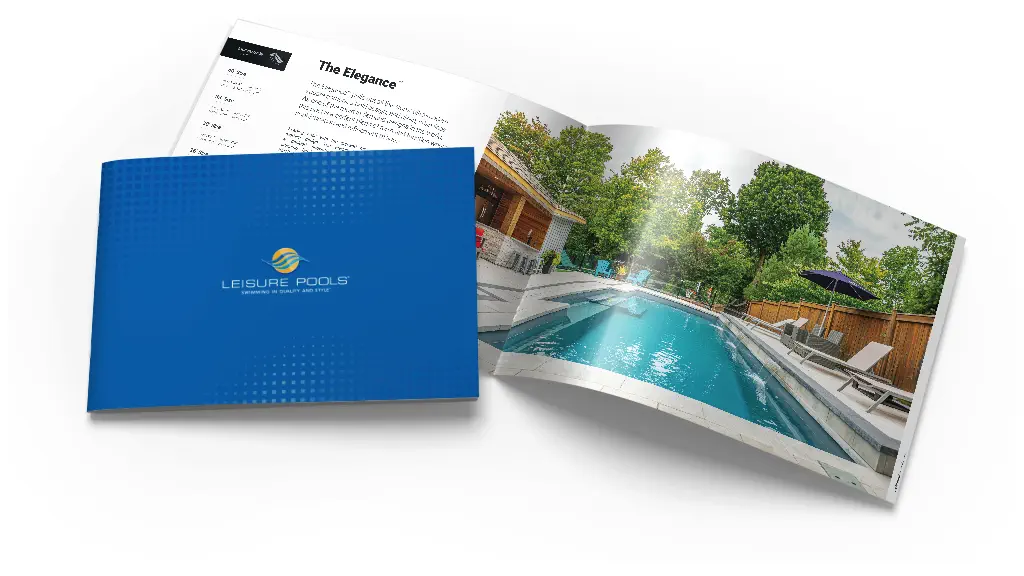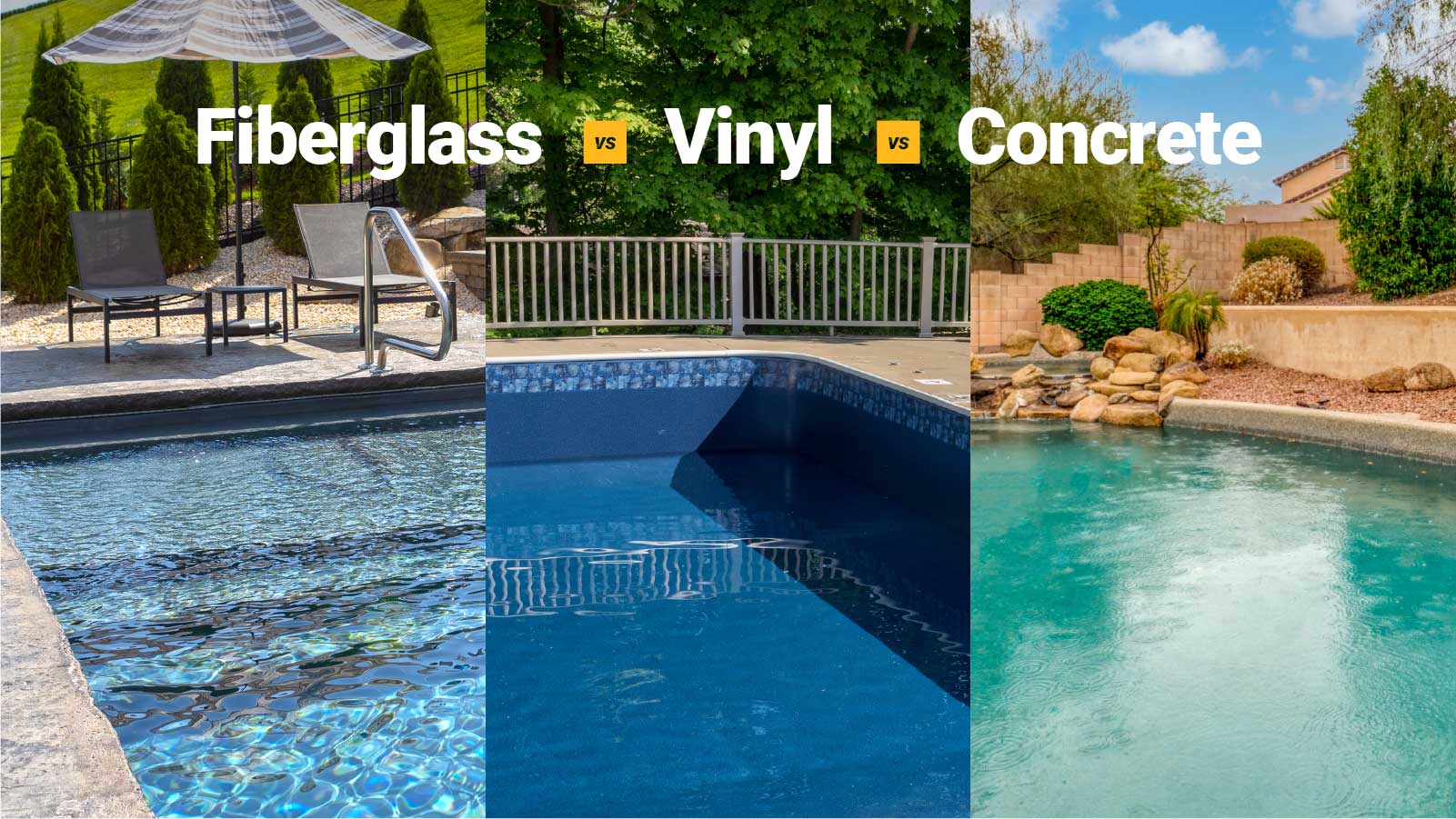
Fiberglass vs. Vinyl vs. Concrete Pools: 2025 Comparison Guide
Choosing the right inground pool is one of the most important decisions you’ll make for your backyard oasis. A swimming pool represents a significant investment, typically ranging from $40,000 to over $120,000, that will impact your family’s lifestyle, property value and financial picture for decades to come. With three primary pool options available—vinyl liner, fiberglass and concrete (also called shotcrete or gunite)—understanding the unique benefits and drawbacks of each type is essential for making an informed investment.
The pool industry has evolved dramatically over the past decade, with new technologies, materials and installation methods transforming what’s possible in backyard design. Modern homeowners have access to advanced filtration systems, energy-efficient equipment, smart pool controls and innovative construction techniques that weren’t available just a few years ago. Each pool type offers distinct advantages depending on your priorities, budget and long-term goals.
Understanding Pool Construction Basics
Before diving into specific pool types, it’s important to understand the fundamental differences in how these pools are constructed, as this directly impacts their performance, longevity and maintenance requirements.
Vinyl liner pools use a structural framework—typically steel or polymer walls—that forms the pool’s shape. A custom-fitted vinyl liner is then installed over this framework to create the waterproof barrier. The liner is essentially a large, custom-made “bag” that holds the water and provides the finished surface.
Fiberglass pools are manufactured in controlled factory environments using advanced composite materials. The complete pool shell is transported to your property and installed as a single unit. This manufacturing process allows for precise quality control, consistent wall thickness, and integration of materials during factory production.
Concrete pools are built entirely on-site by excavating the desired shape and forming it with steel reinforcement (rebar). Concrete (either gunite or shotcrete) is then sprayed or poured over this framework. After curing, the concrete is finished with plaster, aggregate, or tile to create the final surface.
These fundamental construction differences explain why each pool type performs differently in areas like durability, maintenance, customization and cost.
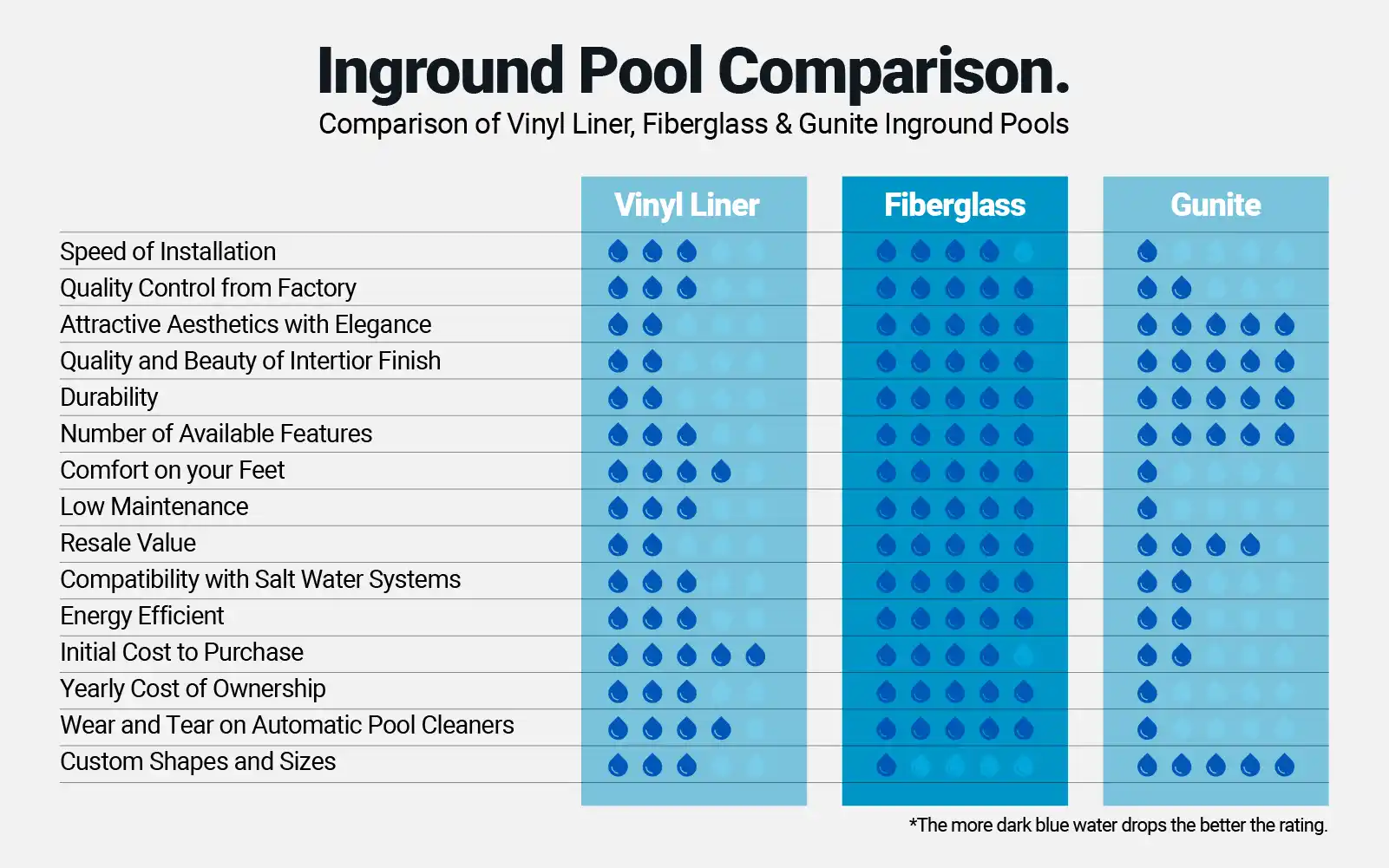
Vinyl Liner Pools
Vinyl pools have been a popular choice for decades, offering an accessible entry point into pool ownership.
Advantages
Lowest Upfront Cost: Vinyl pools typically cost $40,000-$70,000, making them the most budget-friendly option for initial installation. This lower barrier to entry makes pool ownership possible for more families.
Comfortable Swimming Surface: The vinyl liner provides a smooth, non-abrasive surface that’s gentle on skin and won’t snag swimwear. Unlike textured concrete surfaces, vinyl won’t scrape feet or elbows.
Design Flexibility: While not unlimited, vinyl pools offer considerable shape and size options. You can choose from various configurations, depths, and add features like steps, benches and attached spas.
Reasonable Installation Time: Most vinyl pools can be completed in 6-10 weeks, faster than concrete but longer than fiberglass options.
Easy Liner Updates: When it’s time for replacement, new liners can completely refresh the pool’s appearance with updated colors and patterns.
Disadvantages
Ongoing Liner Replacement Costs: Vinyl liners typically need replacement every 8-10 years at $5,000-$7,500 per replacement. This represents the single largest ongoing expense for vinyl pool owners.
Vulnerability to Damage: The liner can be punctured by sharp objects, pet claws or rough play. While small tears can be patched, larger damage may require premature full liner replacement.
Potential Structural Issues: Steel wall components can corrode over time, particularly in saltwater applications. This damage often remains hidden behind the liner until replacement time, potentially adding significant unexpected costs.
Temperature Sensitivity: Extreme temperature changes can cause vinyl to become brittle or expand, potentially leading to premature wear or fitting issues.
Chemical Sensitivity: Improper chemical balance can cause liner fading, staining, or deterioration, shortening the replacement timeline.
Concrete Pools
Concrete pools represent the premium, fully customizable option in pool construction.
Advantages
Complete Design Freedom: Concrete pools can be shaped into virtually any configuration imaginable. From geometric infinity edges to natural lagoon designs, curved walls, integrated spas or complex multi-level features, concrete accommodates unlimited creativity.
Premium Feature Integration: Built-in grottos, waterfalls, swim-up bars, beach entries, and elaborate lighting systems can all be seamlessly incorporated during construction.
Exceptional Structural Strength: When properly engineered and constructed, concrete pools provide unmatched structural integrity that can last for decades.
Property Value Enhancement: Custom concrete pools often add significant value to luxury properties, particularly when professionally designed to complement the home’s architecture.
Size Flexibility: No transportation constraints mean concrete pools can be built to any size or depth requirements.
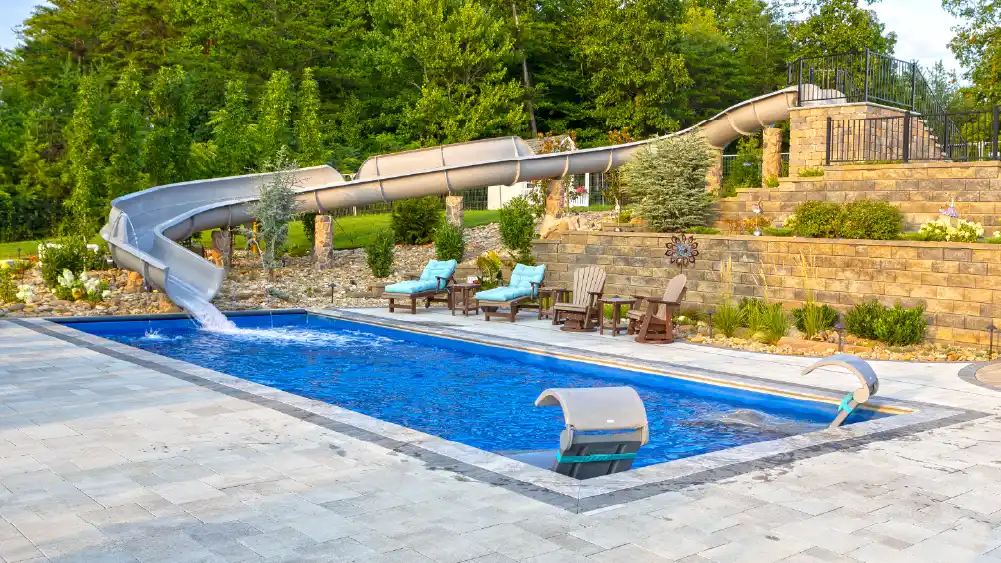
Disadvantages
Highest Initial Investment: Concrete pools typically cost $80,000-$120,000+ for basic installations, with luxury features adding substantially more. This makes them the most expensive option upfront.
Extended Construction Timeline: Concrete pool projects typically take 3-5 months to complete, with weather delays potentially extending the timeline further. This extended process can significantly disrupt your property.
Intensive Maintenance Requirements: The porous nature of concrete surfaces requires regular brushing (2-3 times weekly), careful chemical balancing, and professional maintenance to prevent algae growth and staining.
Rough Surface Texture: The textured concrete finish, while providing slip resistance, can be abrasive on feet and swimwear. This texture also accelerates wear on robotic pool cleaners.
Ongoing Resurfacing Costs: Concrete pools require acid washing every 3-5 years ($500-$800) and complete resurfacing every 7-15 years ($8,000-$15,000), depending on maintenance and water chemistry.
Chemical Consumption: The porous surface typically requires more chemicals to maintain proper water balance compared to non-porous surfaces.
Fiberglass Pools
Fiberglass pools offer a middle-ground approach with distinct characteristics.
Advantages
Low Maintenance Requirements: The smooth, non-porous gel coat surface resists algae growth and makes cleaning easier. Many owners report significantly reduced time spent on pool maintenance.
Quick Installation: Most fiberglass installations are completed in 2-3 weeks from excavation to swimming, minimizing disruption to your property and daily routine.
Durable Construction: Modern fiberglass pools are built with multiple composite layers designed to flex with ground movement while maintaining structural integrity.
Chemical Efficiency: The non-porous surface typically requires fewer chemicals to maintain water balance compared to concrete pools.
Saltwater System Compatibility: Fiberglass gel coat surfaces are not affected by salt, making them suitable for saltwater chlorination systems without concerns about corrosion or surface damage.
Strong Warranty Coverage: Many manufacturers offer substantial warranties on the structural integrity of their fiberglass shells.
Disadvantages
Limited Design Options: Fiberglass pools are available only in predetermined shapes and sizes. While manufacturers offer many designs, completely custom configurations are not possible.
Higher Cost Than Vinyl: Initial costs typically range from $55,000-$100,000, representing a significant premium over vinyl options.
Size and Transportation Constraints: Pools must fit on truck trailers and navigate local roads, typically limiting maximum width to about 16 feet and length to 40 feet.
Repair Complexity: While fiberglass pools rarely need major repairs, when damage does occur, repairs require specialized materials and expertise that may not be locally available.
Color and Finish Limitations: Unlike concrete pools that can be finished with various materials, fiberglass pools are limited to gel coat colors and patterns available from the manufacturer.
Cost Analysis: Total Ownership Perspective
Understanding the true cost of pool ownership requires looking beyond initial purchase price to total cost of ownership over 10-20 years.
Initial Installation Costs
- Vinyl: $40,000-$70,000
- Fiberglass: $55,000-$100,000
- Concrete: $80,000-$120,000+
10-Year Ownership Analysis
Vinyl Pool Total Costs:
- Initial Investment: $40,000-$70,000
- Liner Replacement (Year 8): $6,000
- Annual Maintenance: $1,200-$1,800
- 10-Year Total: $58,000-$94,000
Fiberglass Pool Total Costs:
- Initial Investment: $55,000-$100,000
- Major Repairs: Minimal
- Annual Maintenance: $800-$1,200
- 10-Year Total: $63,000-$112,000
Concrete Pool Total Costs:
- Initial Investment: $80,000-$120,000
- Acid Washing (Years 3, 6, 9): $1,500
- Annual Maintenance: $1,800-$2,500
- 10-Year Total: $99,500-$147,500
Note: These estimates can vary significantly based on location, size, features, maintenance practices and water chemistry management.
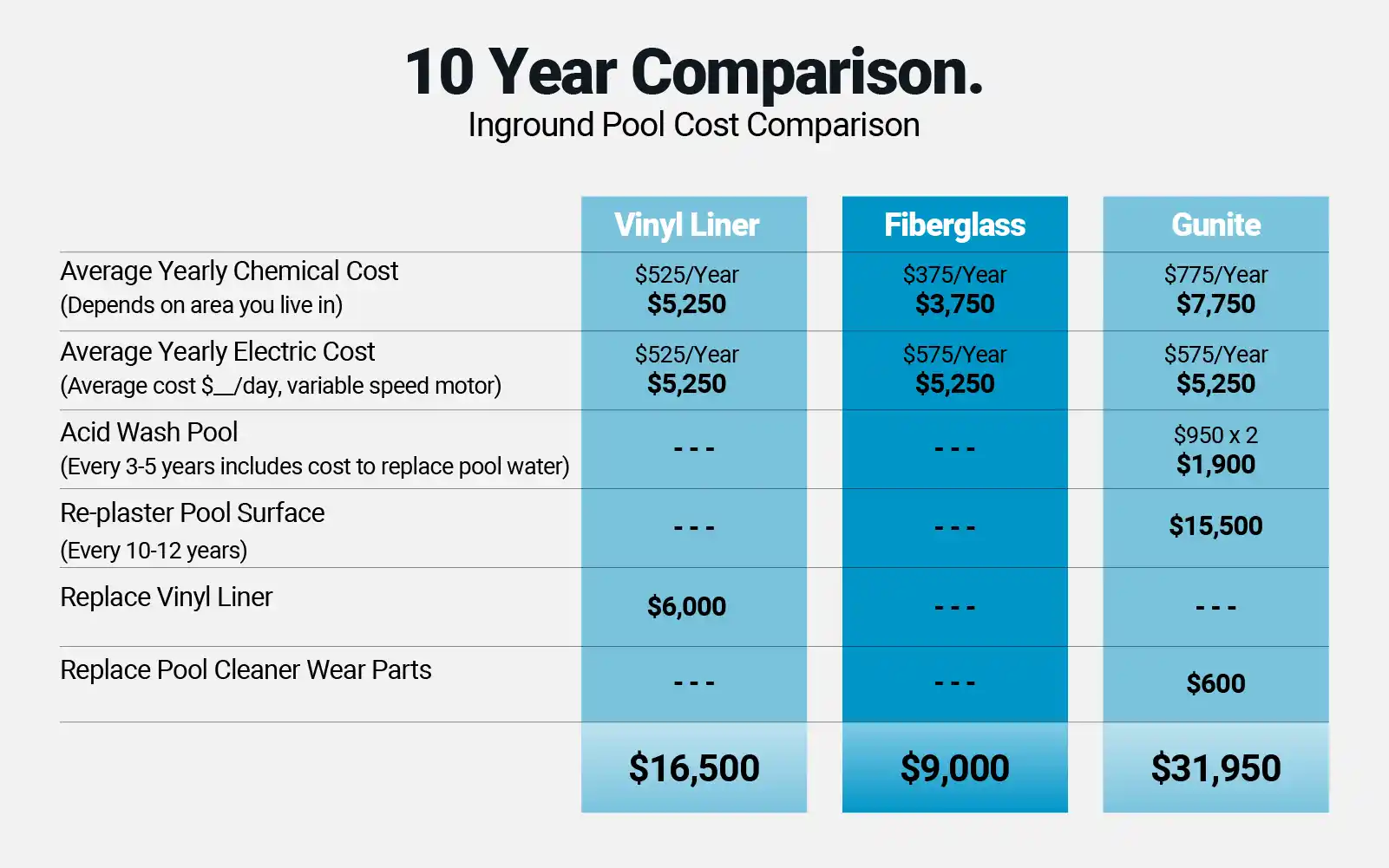
Factors Affecting Long-Term Costs
Chemical Usage: Non-porous surfaces typically require fewer chemicals than porous surfaces.
Energy Consumption: Pool type doesn’t significantly impact energy costs, which are more dependent on equipment efficiency and usage patterns.
Maintenance Time: Consider the value of your time when comparing maintenance requirements across pool types.
Repair Frequency: Some pool types require more frequent professional intervention than others.
Regional and Situational Considerations
Climate Impact: Freeze-thaw cycles affect different pool types differently. Consider your local climate when evaluating long-term durability.
Soil Conditions: Rocky or unstable soil may impact installation complexity and costs differently for each pool type.
Local Regulations: Some areas have restrictions on pool types, construction methods, or installation timelines.
Contractor Availability: The quality and availability of experienced installers varies by region and pool type.
Resale Considerations: Local market preferences may favor certain pool types for property value enhancement.
Industry Trends and Future Considerations
The pool industry continues evolving with new technologies benefiting all construction methods:
Smart Pool Technology: Automated chemical monitoring, remote control systems, and energy-efficient equipment enhance any pool type.
Environmental Concerns: Water conservation, energy efficiency, and sustainable materials are increasingly important factors.
Material Innovations: Each pool type benefits from ongoing material improvements and installation technique refinements.
Maintenance Automation: Robotic cleaners, automated chemical systems, and self-cleaning technologies reduce maintenance burden across all pool types.
Decision-Making Framework
After evaluating all three pool types objectively, certain patterns emerge that can help guide your decision:
Choose Vinyl If:
- Initial budget is your primary constraint
- You prefer a smooth swimming surface
- You’re comfortable with periodic liner replacements
- You want reasonable design flexibility
- You don’t plan to use saltwater systems
Choose Concrete If:
- You have a substantial budget for both initial and ongoing costs
- Complete design customization is essential
- You want to integrate complex architectural features
- You’re willing to invest significant time in maintenance
- Maximum pool size or depth is required
Choose Fiberglass If:
- You prioritize low ongoing maintenance
- Quick installation timeline is important
- You plan to use saltwater chlorination
- You prefer predictable long-term costs
- Available designs meet your aesthetic preferences
Making Your Final Decision
Each pool type serves different priorities and circumstances. The objective analysis reveals that no single pool type is universally “best.” The right choice depends entirely on your specific situation, priorities and long-term goals.
Budget-conscious buyers who can manage periodic maintenance may find vinyl pools perfectly adequate for their needs. Design-focused homeowners with substantial budgets and willingness to invest in ongoing maintenance may prefer the unlimited possibilities of concrete construction.
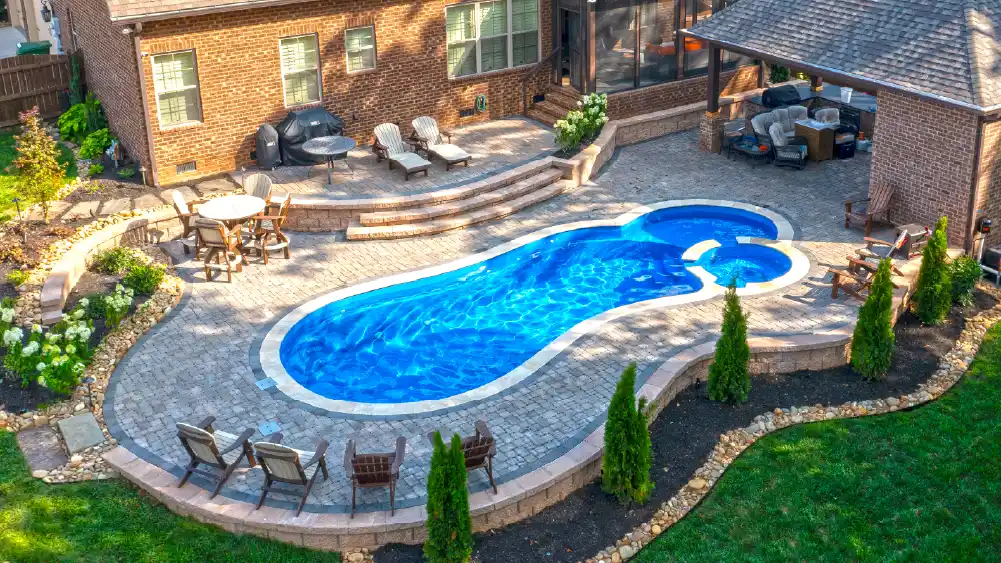
However, for many families seeking a balance of reasonable costs, quick installation and minimal maintenance, fiberglass pools offer compelling advantages. The data shows that while fiberglass pools cost more upfront than vinyl, their lower maintenance requirements and elimination of major recurring expenses like liner replacement often result in competitive total ownership costs. Additionally, the quick installation timeline and saltwater compatibility address two common concerns among modern pool buyers.
The key is honestly assessing your priorities, budget and long-term commitment to pool maintenance. Consider not just what you want today but how your needs and circumstances might change over the 20+ year lifespan of your pool investment.
Advanced Fiberglass Innovation: Leading Manufacturers Make a Difference
If your analysis leads you toward a fiberglass pool, it’s important to understand that significant differences exist between manufacturers. Advanced technology and manufacturing processes can dramatically impact your long-term satisfaction.
Composite Armour™ Technology
Leading manufacturers like Leisure Pools have developed proprietary construction methods that go far beyond standard fiberglass manufacturing. Leisure Pools’ exclusive Composite Armour™ technology combines DuPont™ Kevlar, carbon fiber and basalt fiber in a patented formulation that no other manufacturer can replicate. This advanced composite blend delivers exceptional strength and resilience that addresses traditional concerns about fiberglass durability.
AQUAGUARD®X Premier Gel Coat
Surface technology has also advanced significantly. Leisure Pools’ proprietary AQUAGUARD®X gelcoat represents a breakthrough that addresses one of the few remaining concerns about fiberglass pools—long-term surface integrity in saltwater applications. This exclusive formulation maintains pristine appearance and structural integrity indefinitely, regardless of salt levels.
Why Leisure Pools Leads Fiberglass Innovation
When evaluating fiberglass pool manufacturers, Leisure Pools consistently ranks among the top choices for several compelling reasons:
Exclusive Technology: Patented Composite Armour™ and AQUAGUARD®X technologies simply aren’t available from other manufacturers, providing performance advantages that generic fiberglass cannot match.
Manufacturing Excellence: Decades of refinement in controlled factory environments ensure consistent quality that exceeds industry standards.
Comprehensive Support: From initial design consultation through installation and beyond, Leisure Pools provides industry-leading support throughout your ownership experience.
Proven Performance: Thousands of installations demonstrate exceptional durability and customer satisfaction across diverse climates and conditions.
Ready to Move Forward?
Pool ownership represents one of the most significant lifestyle investments you’ll make. Whether you choose vinyl for its affordability, concrete for its customization possibilities, or fiberglass for its convenience, success depends on making an informed decision that aligns with your specific needs and circumstances.
Take time to visit installed examples of each pool type, speak with current owners about their experiences and carefully evaluate total cost of ownership rather than just initial price. The right pool for your family is the one that best matches your priorities, budget, and long-term goals.
Contact qualified pool professionals to discuss your specific situation and explore options within your preferred pool type. For fiberglass pool considerations, Leisure Pools dealers can help you evaluate whether advanced fiberglass technology aligns with your vision for the perfect backyard oasis.

